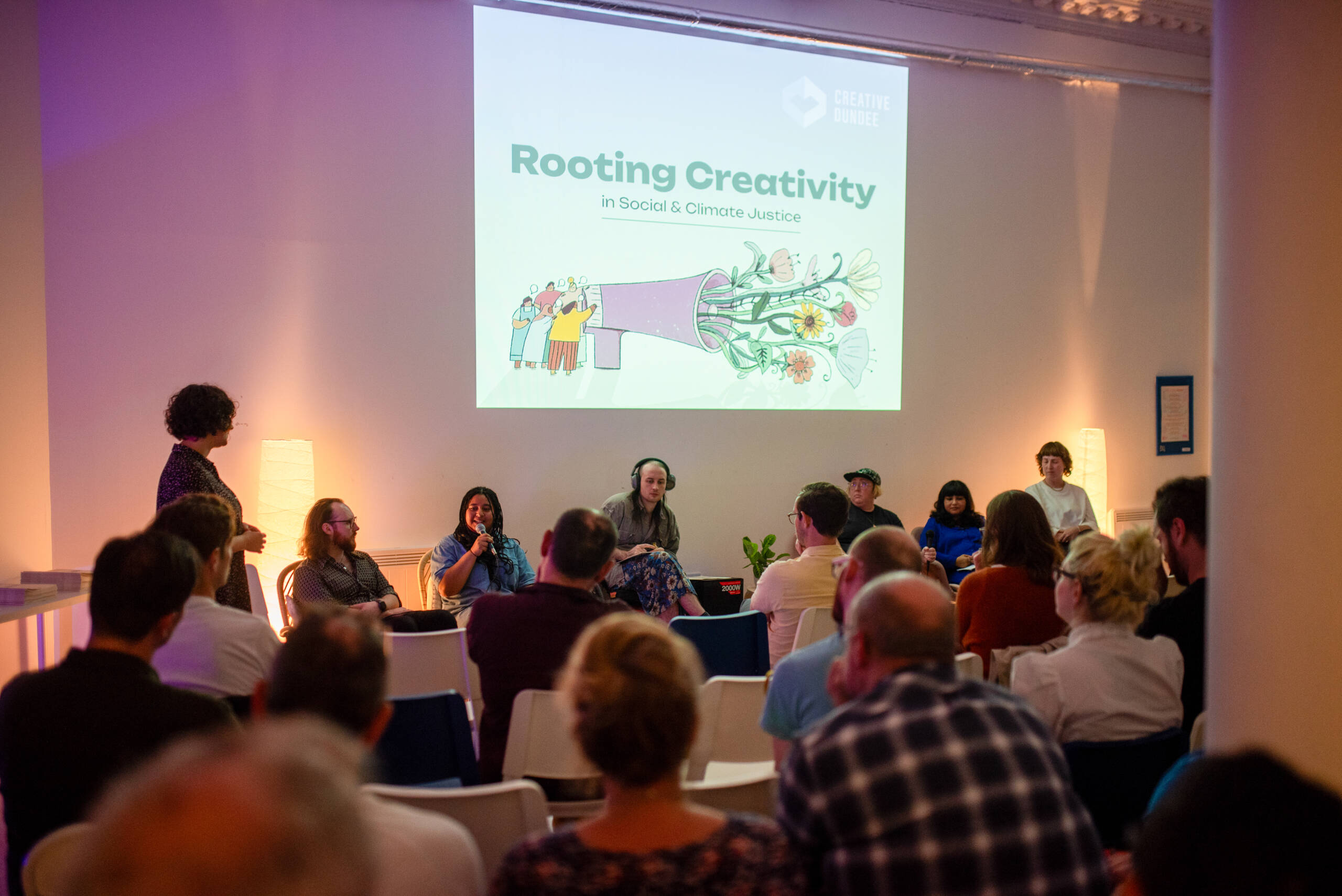
07.10.24

In mid-September, we hosted a special event to shine a spotlight on local and further afield projects which embrace creativity to engage communities and respond to social and climate justice issues.
As part of Rooting Creativity in Social & Climate Justice, we asked writer Cheryl McGregor to join us for the evening and capture the thoughts, ideas, and reflections shared by our brilliant panel of creative practitioners; Ink Asher Hemp, Vinishree Verma, Jek McAllister, Khadea Santi, Conor McConville, and Jaz Grady. Find out more about our speakers.
Creative Dundee’s Claire Dufour welcomed the audience, acknowledging the multiple crises of today, such as the cost of living, climate emergency, and growing mental health crisis in the wake of the COVID-19 pandemic. These challenges amplify the value of creative communities, and the event’s discussions explored the necessary skills and conditions needed to support them. In the absence of speaker Douglas Lonie, a short presentation was given examining the human-centered research and evaluations produced by tialt (there is an alternative) for the CULTIVATE report Ripple Effects: Creativity and Climate Justice, critically examining the role of language as well as offering practical recommendations for safe(r) spaces.
Creator and activist Ink Asher Hemp opened with a poem about (more than just) soap and whales. Delving into the root of the word ‘crisis’—from the Ancient Greek word meaning the turning point of an illness—Hemp explored the complexities of resistance, concluding, “to dream in crisis is to compost.” The poem highlighted the paradox of making issues like climate change ‘child-friendly’—an impossibility since they aren’t.
As the inheritors of these crises, young people formed the focus of the first panel, hosted by Khadea Santi, Conor McConville, and Jek McAllister. Arts educator Khadea was the first to speak, her words accompanied by photographs of children molding clay at an after-school club in Wester Hailes, Edinburgh, their heads bowed in concentration. Another photograph showed their heads adorned by carnival headdresses – a project initiated by the children and used by Khadea to reflect on their (often-erased) shared histories. She discussed how this kind of creative engagement helped children feel connected to their cultural heritage, something often missing from traditional education.
Conor, a Recovery & Support Coordinator at Feeling Strong, discussed his work tackling the stigma of addiction among young people. His multi-phased project, ‘Synthesis’, engaged young people in addressing climate change and eco-anxiety through art. One memorable piece of artwork depicted a “beetle made of plastic holding up a dead world”—a haunting yet striking representation of the themes explored.
Jek McAllister spoke next, reflecting on her experience working with Wooosh, Forgan Arts, and the Ninewells Community Garden. Her practice is the accumulation of years working in hospitality while attending art school, her shift to horticulture and her role as the lead of the Alternative (Art) School at Forgan Arts Centre in Fife. This community-led initiative offered an alternative to mainstream education, providing school-refusers with activities like joinery, music-making, ceramics, filmmaking, and food preparation. She highlighted how these alternative education methods empowered young people to develop practical skills while fostering creativity.



The panel was asked how they create space for young people to be themselves, participate, and build confidence. Conor focused on practical considerations, such as the importance of Feeling Strong’s hub being located near central bus routes and the flexible layout of the space, with chairs and tables easily moved to accommodate different activities. (He also mentioned the years-long waiting list for CAHMS, a point of concern I feel is paramount to echo).
Khadea addressed another widely acknowledged issue: although she is an artist, not a social worker, the closure of government programs and the pressures on social work blur the roles practitioners are expected to play. She emphasised the importance of knowing when to pass vulnerable people to legal and mutual aid services.
Conor added a thoughtful comment on measuring the impact of his work, noting that the outcomes desired by funding bodies are far more visible in the artworks created by young people than in any evaluation forms. The projects, he said, succeed because they are designed “for young people, by young people” and their multivalent experiences cannot be fully realised using standardised metrics.
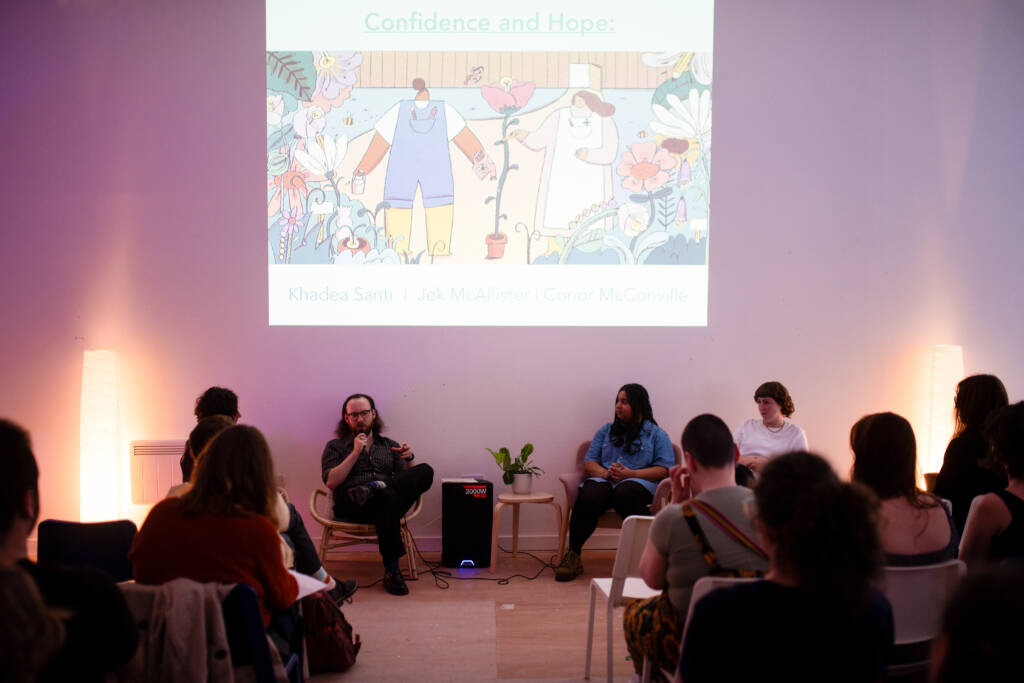
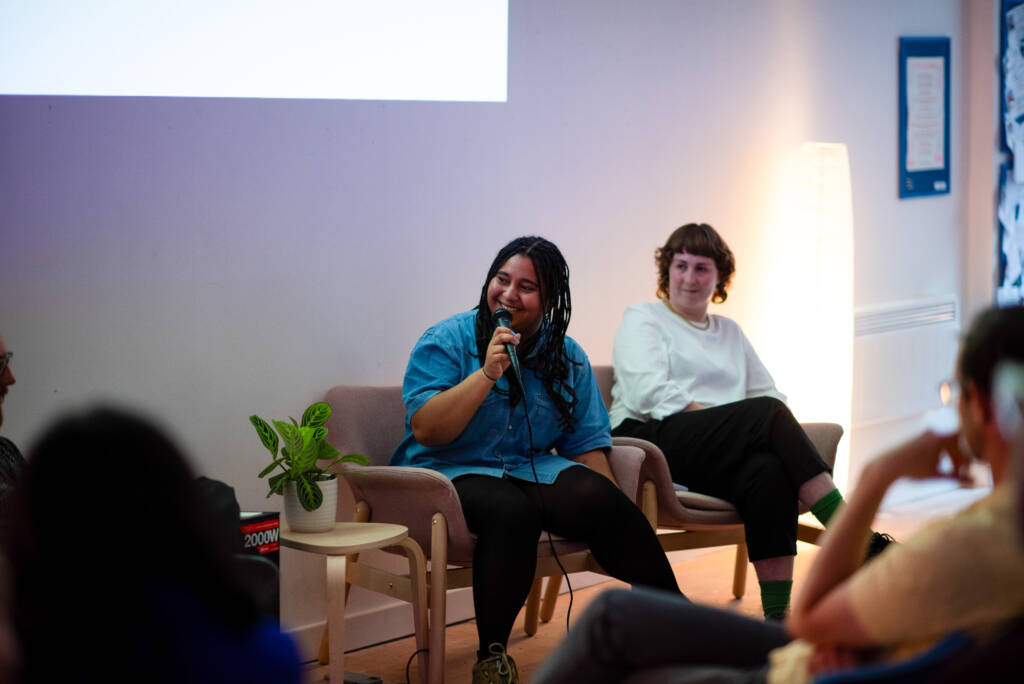
The second panel, titled ‘Bring a Seat, Create the Table,’ featured Vinishree Verma, Jaz Grady and Ink Asher Hemp. Vini led the discussion on open-ended processes, describing her project ‘Dear Earth‘ that brought women from over 15 countries together to explore climate justice in communities most affected by it. She stressed the importance of trusting the process and being open to learning from failure, encouraging everyone to view challenges as opportunities for growth and change.
Jaz echoed this sentiment, sharing the difficulties of finding a physical space for their youth arts programme, which involved difficulties such as an almost two-month long battle over real estate. Despite the frustrations, Jaz’s message was clear: tenacity is key, and adapting to roadblocks is essential when working in underfunded sectors.
Ink’s approach to climate justice, informed by disability justice, provided a unique framework for action. They cited the ’10 principles of disability justice’ as central to their work and noted, “just because the body holds knowledge, doesn’t mean it holds the answers.” Ink highlighted the importance of centring marginalised voices, particularly in spaces that aim to foster inclusion. They advocated for grounding practice in both theory and intuition, exploring not just what’s been done but what’s possible.



Jaz challenged the scarcity mindset common among creative practitioners, stating, “we do not need to take the table given, the one cut from the forest—we can build our own or even sit on the floor.” Jaz and Ink further discussed how to make projects and spaces safer for participants, touching on the value of anonymity, temporal flexibility, and the delicate balance of excluding certain groups for the safety of others.
Vini reiterated the importance of food as a universal language, recalling Jek’s earlier comments about food’s role in fostering comfort and confidence. She used food as a metaphor for climate justice, urging us to think critically about how it reaches our plates and ends up in our bins —and who is responsible for cleaning up afterwards.
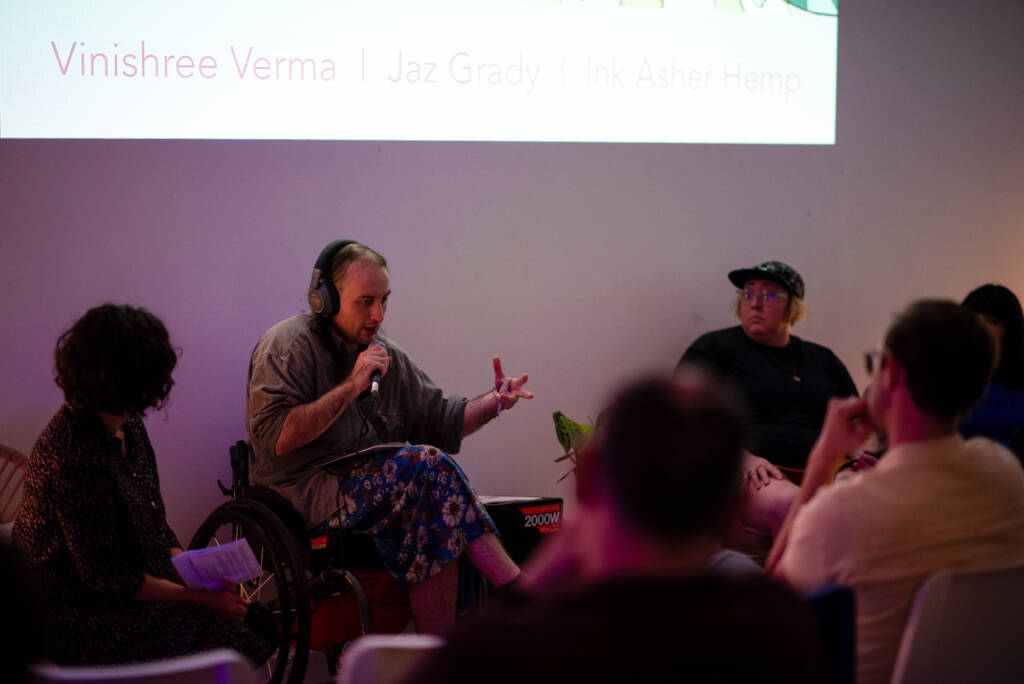
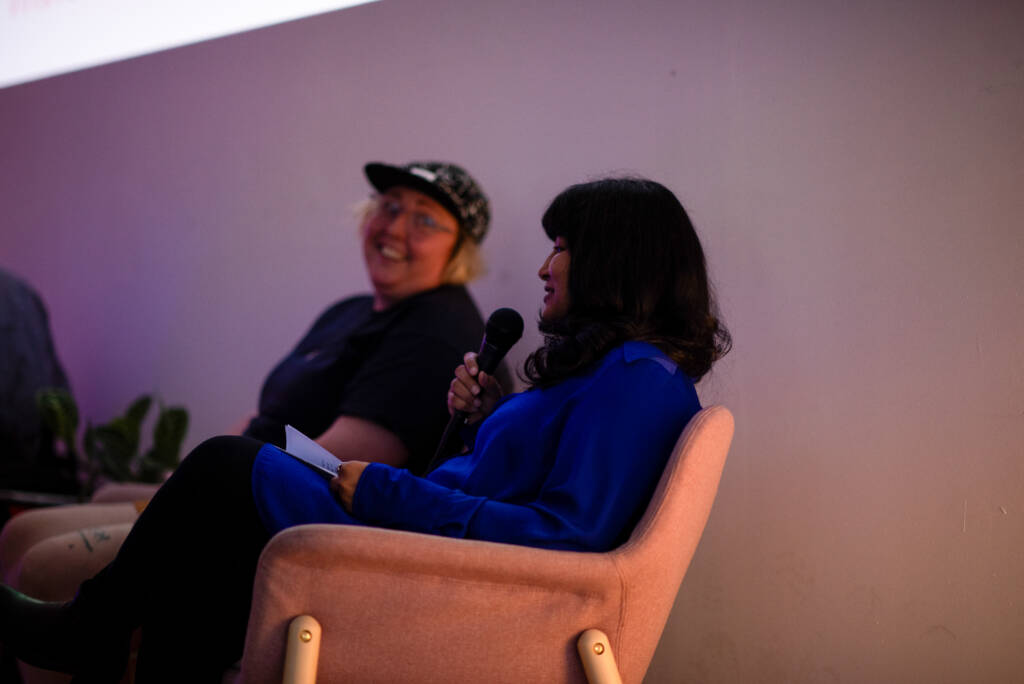
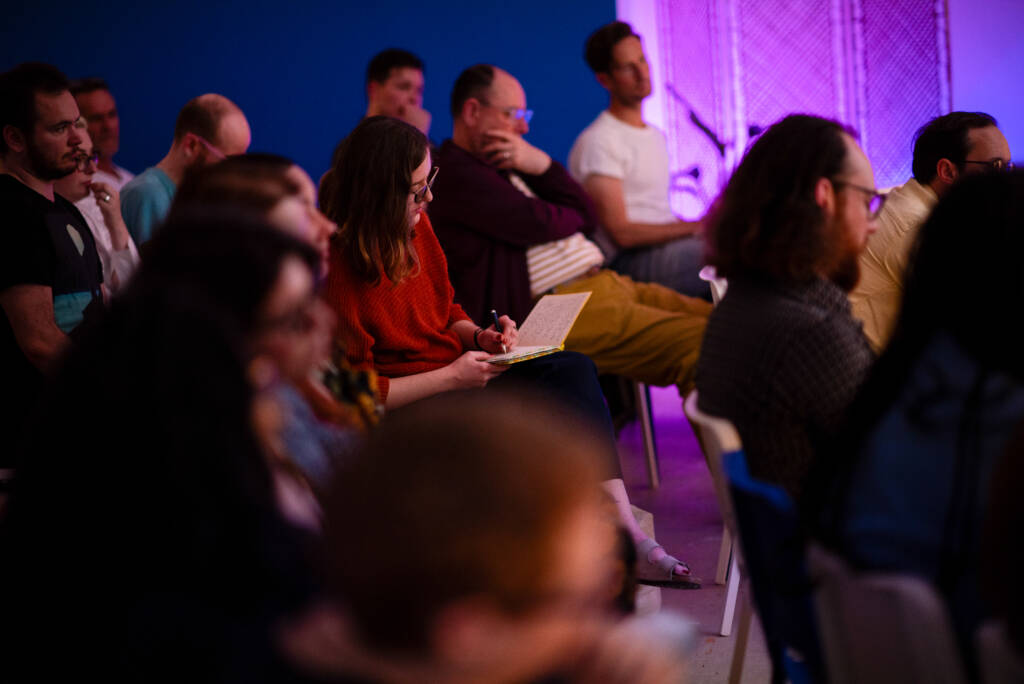
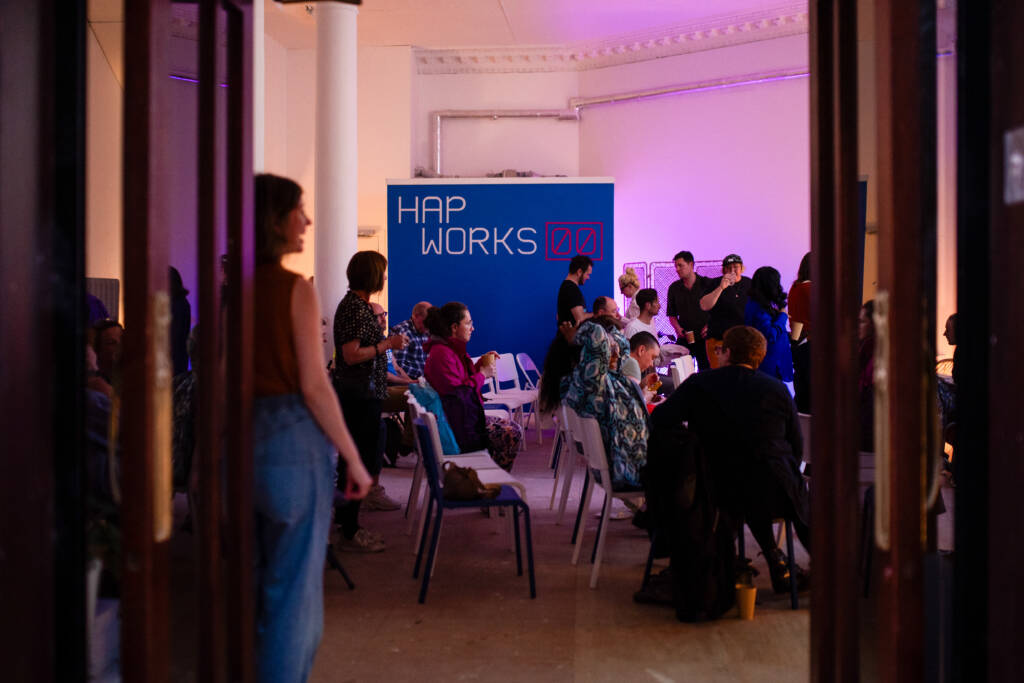
In the final discussion on self-care for creative practitioners, Khadea addressed the loneliness of freelancing and the precariousness of such work. Conor stressed the importance of continuing to make as a coping mechanism, and Vini highlighted the necessity of debriefing and knowing when to rely on experts. Jek echoed the value of peer support, and Khadea emphasised the need to find time to be vocal about the challenges faced.
In an increasingly-difficult time for the arts, Creative Dundee’s panel discussion reminds our city’s creatives what is both possible and necessary, showcasing how harnessing creativity, collaboration and resilience can create spaces for communities to reimagine a future rooted in justice, care and collective action.
Cheryl McGregor is an arts writer and poet based in Dundee. An English Literature graduate from the University of Dundee, Cheryl writes for money and love – but not necessarily in that order. Find more examples of her writing here.
Led by Creative Dundee over three years, CULTIVATE brought together creative practitioners and community groups across the Tay region to explore climate justice in a practical and meaningful way. CULTIVATE was part of Culture Collective, a network of participatory arts projects across Scotland, shaped by local communities alongside artists and creative organisations. Funded by the Scottish Government through Creative Scotland.

If you would like to support us in creating even better content, please consider joining or supporting our Amps Community.